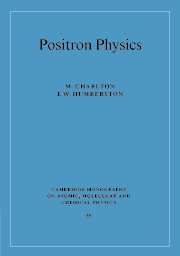Book contents
Preface
Published online by Cambridge University Press: 15 August 2009
Summary
This book is concerned mainly with the interactions of positrons and positronium with individual atoms and molecules in gases. Brief mention is also made of positrons interacting with bulk matter but this is in the context of describing the slowing down of positrons in solids and the subsequent ejection of low energy positrons and positronium from the surface of the solid. A technique using the angular correlation of annihilation radiation, which is widely used in studies of electron momentum distributions and defects in condensed matter, is also described but again the emphasis is mainly on positron annihilation in gases.
Theoretical studies of positron collisions with atomic and molecular systems have been made for many years, as also have both theoretical and experimental studies of the lifetimes of positrons diffusing in gases. Only since the development of energy-tunable monoenergetic positron beams in the early 1970s, however, has it been possible to make detailed comparisons between theoretical predictions and the increasingly accurate experimental measurements of total, partial and differential scattering cross sections. These experimental developments have in turn stimulated renewed interest in theoretical studies of systems containing positrons. In this book we have attempted to integrate both theoretical and experimental aspects of the field into a reasonably coherent whole, although some sections are predominantly either experimental or theoretical.
Positron physics has undergone very rapid development during the past several years.
- Type
- Chapter
- Information
- Positron Physics , pp. ix - xPublisher: Cambridge University PressPrint publication year: 2000

